Women in the New Space Sector - A recruitment insight
Equality for Women in New Space

As responsible recruiters for the Space Sector, EVONA believe in equality. We are in the privileged position to work with inspirational brilliant women all over the globe as they pursue their next career move in the Space sector. We’re also pivotal to changing the conversations around gender parity in the New Space sector and influential in positioning the BEST candidates into the most exciting roles that Space has to offer.
To date, only 566 people have ever travelled to space. Only sixty-five of them, or about 11.5 %, were women.
Whilst it’s true that the space sector and aerospace industry boasts a number of women in high-ranking positions, including: Leanne Caret, Executive Vice President of the Boeing Company as well as President and CEO Defense Space & Security; Gwynne Shotwell, engineer, president and COO of SpaceX; and Ellen Stofan, the head of the National Air and Space Museum who previously served as NASA’s chief scientist – women still remain in the minority among the wider industry.
Historically, space has been a very male-dominated sector. For example, women make up only about a third of NASA’s workforce and only 16 percent of senior employees. As the industry evolves, we’ve seen the emergence of the New Space sector. So, have traditional mindsets also renewed to allow women more space?
What’s the New Space sector?
The government used to have majority control over the direction of the space sector, but private companies and investors have moved in and now play a valuable role in fuelling innovation, diversification and change. It is this increased commercialisation and diversification of skills that has earned it the title ‘The New Space’ sector.
You can only effect change by providing solutions
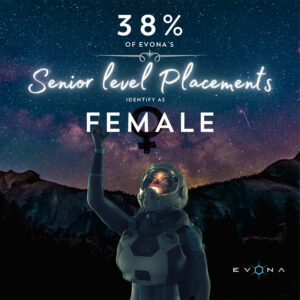
Analysing our own data within the New Space sector, as the below infographic shows, only 17% of C-level and senior positions (including founders, owners and entrepreneurs) are held by women – a statistic mirrored globally with only 18% of women in positions of power throughout the workforce.
12% of the founders, owners or entrepreneurs in the New Space market identify as female. That means that 7 out of 10 of the women in positions of power have put themselves there by owning or founding their own Space business.
EVONA are proud that we’re trying to push the needle on these statistics and can boast that despite only 17% of senior executives in New Space identifying as female, nearly 2/5 (38%) of our placements into these positions are women. We recognise that this isn’t 50/50 yet, but we’ll always strive to deliver the best candidate to our clients and challenge outdated perceptions.
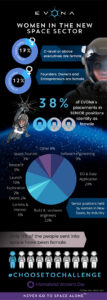
The company of women
When EVONA analysed the senior positions of women within the New Space sector we saw that there is a preference for women to go into Data Application or Earth Observation organisations. 29% of the women in a position of power (c-level or above) worked within Earth Observation companies.
When we compare this to the whole of market statistics issues by Morgan Stanley in 2017, it’s interesting to note that Earth Observation companies occupy only 14% of the sector, representing the 3rd largest segment. Earth Observation companies therefore seem to be the kinds of companies where women feel most affinity. Research sectors also seem like popular companies for women to move into. Anecdotally, this is also a trend that EVONA sees amongst the candidates applying for positions within these companies. In general we seem to see a more equal number of both men and women apply for roles in Earth Observation.
However, it’s not true to say women will represent a majority of any of these segments, making up only 17% of the whole senior workforce, so why are women still so under represented?
The solution lies in education
It is widely known that there is a shortfall of women studying STEM subjects. So part of this issue comes from a lack of supply. Stereotypical norms and cultural beliefs dampen the desire for girls to study STEM subjects and graduate into STEM careers. Only 31% of engineer graduates in 2020 were women with only 24% of individuals in an engineering profession as of last year identifying as female. Part of the solution is to inspire future generations into STEM subjects and show young girls they will have a place in the sector.
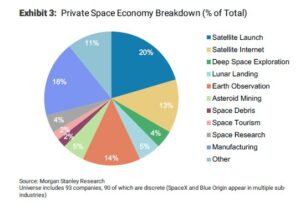
We can do more as recruiters
We also know that the barriers facing young women won’t stop when they enter the sector. We require strong female role models for our younger generations to follow. That’s why we’ve approached some of the most inspirational women in the sector to share their career journeys.
Until articles like this become archived for irrelevance, or women achieving ‘firsts’ in the sector is no longer worth notoriety, there will still be a way to go but we can help by being part of the solution. Our thanks to the following inspirational women in our network for providing their story on their journey ‘into space’.
Portia Bowman
UK Innovation Manager at D-Orbit
“I have worked on hardware that is or soon will be on the moon, on Mars and in Earth Orbit!”
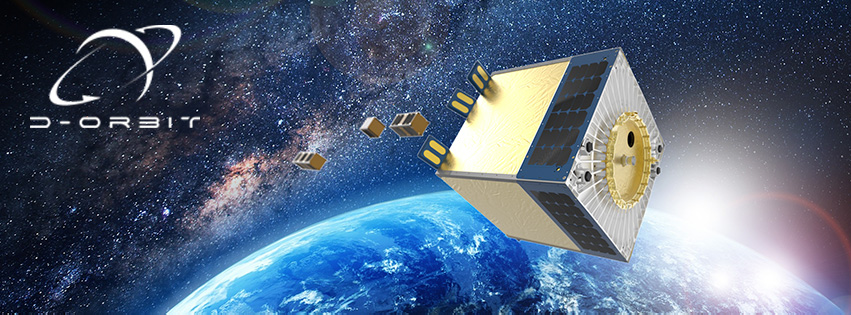
- What you do?
I am UK Innovation Manager at D-Orbit. I sit between customer and technical to come up with new ideas for product and services that are driven by market needs. This involves a lot of talking to lots of different types of people, identifying and following up with new opportunities, and planning for the future.”
- How did you get into the space sector?
I did a placement during my Masters degree and got offered a job there after I graduated. In hindsight it all looks very planned, but at each stage I had no idea what the next step was going to be and just said yes to opportunities that came my way and tried to make the most out of them. Volunteering for UKSEDS, the national student space society, definitely helped!
- What did you study?
I studied Physics with Astrophysics and did a Masters in Space Exploration Systems at the University of Leicester. At school I studied Maths Physics and Chemistry A-Levels.
- What do you regard as your best professional achievement?
I have worked on hardware that is or soon will be on the moon, on Mars and in Earth Orbit!
- What single piece of advice to you give the next generation who want to pursue a career like yours?
I would say there isn’t one career path and you can take many different routes to get somewhere, so just follow what you are passionate about and communicate that passion to whoever will listen!
- Any women in the sector that inspired you personally?
There are many! A particular mention to Claire Parfitt and Lucy Berthoud who befriended and mentored me when I first joined the sector.
- How has EVONA helped?
EVONA’s passion and enthusiasm is extremely motivating, and I am impressed at your outreach efforts and helping the next generation
Bianca Cefalo
Founder of Cosmica Space Consulting and Director of Business Development at Carbice Corporation
“Feed your thirst for curiosity and learning new things. Being underestimated is a superpower”

- What do you do?
As Director of International Business Development at Carbice Corporation – Atlanta-based Deep Tech Startup – I help International Customers in the Aerospace, Space, Defence & Semiconductors industry choosing the most revolutionary nanotechnology as thermal management solution for their high-performance systems.
As Founder of Cosmica Space Consulting Ltd, I advocate for Equality & Humankind Evolution through Conscious Space Exploration and Exponential Technological Advancement in the New Space Age. Promoting international projects and collaborations that foster education in STEM, Space & Aerospace subjects; as well as mentoring programs dedicated primarily to women and girls, with a particular focus on activism for women’s human rights, and inclusion and integration of ethnic, social and gender minorities.
- How did you get into the space sector?
A nerd since I was 7yo. I loved robots, cars, typing machines & philosophy. I was obsessed with aerodynamics for Formula 1 Cars, which during my university years escalated to obsession for hypersonic Space Capsules and aero-thermo-fluid dynamics of Interplanetary Missions. So, when I was 23yo I packed my bags, flew from Naples to Berlin, and fell into Space Science – having being selected as the youngest Italian analyst assigned to the HP3 Instrument on the NASA/JPL Insight Mars Mission, developed as a collaboration between Active Space Technologies GmbH & the German Space Agency (DLR).
- What did you study?
In Italy went to the ‘Liceo Scientifico Sperimentale’, which equals the UK STEM A-Levels, with focus on Maths, Physics, Chemistry, Science, Astronomy & Languages. Then I graduated in Aerospace and Astronautical Engineering at the University of Naples ‘Federico II’, with focus on Spacecraft Systems, Hypersonic Aerodynamics, Microgravity and Synthetic Aperture Radars.
- What single piece of advice do you give the next generation who want to pursue a career like yours?
Most probably there will be people telling you ‘You can’t do it’, that is too difficult and unconventional for a girl. Especially if you’re a first-gen graduate and you come from an unprivileged & dysfunctional family background – as I do. Use that as a motivation to get better and better every day. Feed your thirst for curiosity and learning new things. Being underestimated is a superpower. Also, don’t be shy about your talents and ambitions, share them with your support network, your teachers and peers and ask for what you want, always. Do the ask, be specific, be annoying, and you’ll see how many doors will open up!
Lisa Thomas – Honeybee Robotics
“Take chances on yourself and start taking action, even when it’s scary.”
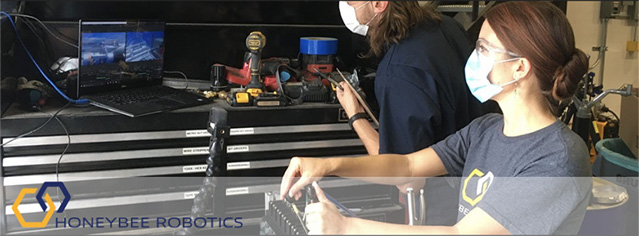
- What you do?
I manage space exploration projects for Honeybee Robotics. That means I organize and manage teams of engineers who are building new technologies to collect planetary samples, such as dirt and ice from places like the Moon or Mars!
- How did you get into the space sector?
I got into the space sector because I took a chance at the right time. I saw that a job was available at a space company and, even though I didn’t have space-related experience at the time, I gave it a try anyway. I was hired and I never looked back. I decided space was the place for me.
- What did you study?
I studied a STEM subject – I have a Bachelor’s and a Master’s degree in Mechanical Engineering. It was a real challenge sometimes, but I’m glad every day that I did it.
- What do you regard as your best professional achievement
I helped to build and launch a module called BEAM to the International Space Station. I was even able to watch the astronauts go inside our module and talk to us about it. It was the adventure of a lifetime!
- What single piece of advice to you give the next generation who want to pursue a career like yours?
You will never feel “ready” to make big moves in your career or to take on challenges, so courage is important. Take chances on yourself and start taking action, even when it’s scary. I’ve learned the most over the years by just giving new things a try! Give every effort your best, ask for help (asking for help is brave!), and be prepared to make mistakes and learn from them.
- Any great stories about your career that you can share
I had the chance to meet and talk with Astronaut Scott Kelly after his year in space. What impacted me most about him was his passion for his job. Even after a year away from his family and a lot of physical pain from the trip, he expressed only love and gratitude for the opportunity to be a space pioneer.
- Any women in the sector that inspired you personally
There is an outstanding NASA manager at Johnson Space Center, named Sharon Conover, who has been an inspiration to me for many years. She taught me to always take time to share what you learn with others.
- How has EVONA helped?
EVONA has helped my team grow! A project’s success is determined by the quality of the team, so this contribution is extremely important to us reaching our goals.